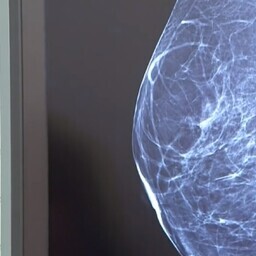Inimgeeniuuringute seadus jõustub järgmisel aastal.
See lubab kasutada geeniandmeid meditsiinis. Näiteks saab nüüd
hinnata rinnavähi riski
.
hinnata rinnavähi riski
Tõlge fraasile: hinnata rinnavähi riski
EN
assess the risk of breast cancer
Geeniandmed aitavad ka varem haigusi avastada
. Näiteks
kutsutakse naised mammograafiale
juba 40-aastaselt, mitte 50-aastaselt.
Geeniandmed aitavad ka varem haigusi avastada
Tõlge fraasile: Geeniandmed aitavad ka varem haigusi avastada
EN
Genetic data also helps detect diseases earlier
kutsutakse naised mammograafiale
Tõlge fraasile: kutsutakse naised mammograafiale
EN
women are invited for mammography
Tervisekassa juhib seda süsteemi
. Krista Kruuv-Käo selgitas, kuidas see töötab.
Tervisekassa juhib seda süsteemi
Tõlge fraasile: Tervisekassa juhib seda süsteemi
EN
The Health Insurance Fund manages this system
Kõigepealt
saab naine kutse vastu
. Ta on kas 40-aastane või vanem. Kutsel on kaks võimalust.
saab naine kutse vastu
Tõlge fraasile: saab naine kutse vastu
EN
the woman receives an invitation
Kui naine ei ole geenidoonor, siis ta
registreerib ennast lähedal olevasse haiglasse
. Seal
tehakse talle geenitest
.
registreerib ennast lähedal olevasse haiglasse
Tõlge fraasile: registreerib ennast lähedal olevasse haiglasse
EN
registers at a nearby hospital
tehakse talle geenitest
Tõlge fraasile: tehakse talle geenitest
EN
a genetic test is performed on her
Kui naine on geenidoonor, siis ta peab esmalt minema terviseportaali. Seal
annab ta nõusoleku oma andmete kasutamiseks
.
annab ta nõusoleku oma andmete kasutamiseks
Tõlge fraasile: annab ta nõusoleku oma andmete kasutamiseks
EN
she gives consent for the use of her data
Kui
rinnavähi risk on kõrge
, siis naine
käib mammograafias sagedamini
. Kui risk on madal, siis järgmine kutse tuleb 50-aastaselt.
rinnavähi risk on kõrge
Tõlge fraasile: rinnavähi risk on kõrge
EN
the risk of breast cancer is high
käib mammograafias sagedamini
Tõlge fraasile: käib mammograafias sagedamini
EN
goes for mammography more often
Krista Kruuv-Käo ütles, et see uus süsteem on
Eesti tervishoiu suur edasiminek
.
Eesti tervishoiu suur edasiminek
Tõlge fraasile: Eesti tervishoiu suur edasiminek
EN
a major advancement in Estonian healthcare
Geeniandmete kasutamine aitab
paremini ennetada haigusi ja määrata ravi
. Uued teenused töötatakse järk-järgult välja.
paremini ennetada haigusi ja määrata ravi
Tõlge fraasile: paremini ennetada haigusi ja määrata ravi
EN
better prevent diseases and prescribe treatment
Krista Kruuv-Käo rääkis, et geeniandmete põhise antidepressantide määramine võib algada paar aasta pärast.
Kui naine ei soovi 40-aastaselt testi teha, siis saab ta seda teha ka 50-aastaselt.
Rinnavähi risk ei pärandu vanemalt lapsele.
The Human Genes Research Act will come into force next year.
It allows the use of genetic data in medicine. For example, it is now possible to assess breast cancer risk.
Genetic data also helps detect diseases earlier. For instance, women will be invited for mammography at age 40 instead of 50.
The Health Insurance Fund manages this system. Krista Kruuv-Käo explained how it works.
First, a woman receives an invitation. She is either 40 years old or older. The invitation offers two options.
If the woman is not a gene donor, she registers at a nearby hospital. There, she undergoes a genetic test.
If the woman is a gene donor, she must first visit the health portal. There, she gives consent for her data to be used.
If the breast cancer risk is high, the woman will undergo mammography more frequently. If the risk is low, the next invitation will come at age 50.
Krista Kruuv-Käo said that this new system is a major advancement in Estonia's healthcare.
Using genetic data helps better prevent diseases and prescribe treatments. New services will be developed gradually.
Krista Kruuv-Käo mentioned that prescribing antidepressants based on genetic data may begin in a couple of years.
If a woman does not wish to take the test at age 40, she can do it at age 50.
Breast cancer risk is not inherited from parent to child.

